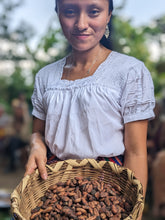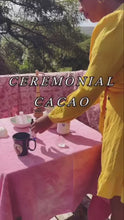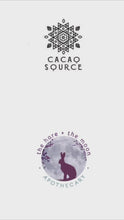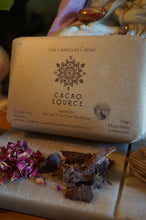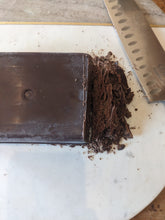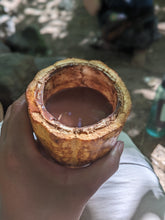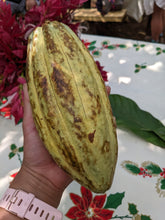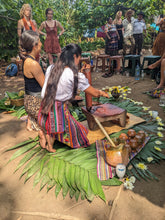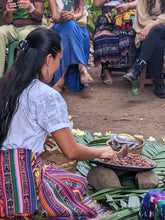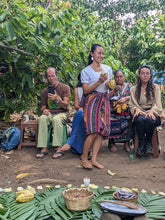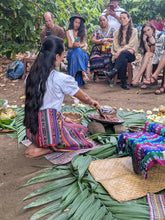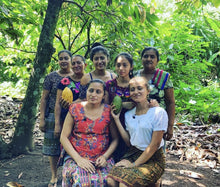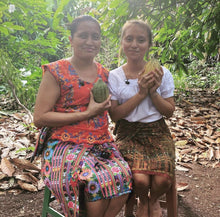
 Cacao has been traded across Mesoamerica for thousands of years. Based in Lake Atitlan, we source from Guatemalan rainforests, reaching isolated organic farmers.
Cacao has been traded across Mesoamerica for thousands of years. Based in Lake Atitlan, we source from Guatemalan rainforests, reaching isolated organic farmers.
Learn more about Cacao here.
What is Cacao?
Cacao is simply the bean-like seeds of the Theobroma cacao tree. The true magic of most cacao becomes diluted beyond recognition when it is processed into chocolate with added fat and sugar. Unlike these conventional chocolate bars or cacao powders, the active ingredients and butter are preserved in ceremonial cacao whilst the bean is gently fermented and ground into a rich paste. For cacao to be 'ceremonial grade', it must be grown, dried, and prepared to preserve its biochemical and energetic qualities. Ceremonial cacao usually comes from the rare and delicate Criollo (wild/native) variety rather than the much more common and hardy Forastero. This means it should be fair-trade, sustainably sourced, and lovingly produced by communities of indigenous people with the tradition of cacao on their native land. (How much cacao is used in the confectionery industry certainly is not).
My reasons for collaborating with Cacao Source
Cacao Source is all about providing an authentic and transparent experience with their cacao. Their commitment to sourcing every product to a single origin is the core of their mission. They carefully select cacao from three unique regions - the Suchitepequez on the Pacific front, Alta Verapaz in central north Guatemala, and Izabal on the Caribbean front. They partner with indigenous Mayan communities that cultivate rare strains of cacao in isolated food forests. Cacao Source only works with farmers who meet their strict standards for quality, which include using organic soils, paying fair wages, and participating in revitalization programs. Cacao Source chooses to work with small-scale farmers instead of large plantations or corporations, setting them apart from other chocolate business corporations.
Agroforestry, fair trade, and organic agriculture go hand-in-hand as the health of the farmers is essential. If the farming community is exposed to chemical fertilisers and pesticides, it often affects their health in the long term. As long as we keep buying products that use chemicals, companies will keep producing in such a manner, and our farming community's livelihood will be affected by such practices. When our food grows in a mono-culture system, even if farmers are paid well and organic fertilisers and pesticides are used, farmers' well-being is related to the soil's well-being. A mono-culture system impacts biodiversity, food sovereignty, and soil nutrients. In a mono-culture farm, fewer workers diminish local opportunities, resulting in a lower percentage of revenue remaining in the producer country.
Laurence Tremblay~ Social Business Manager Cacao Sourcce.
Single Origin Ceremonial-grade Cacao from Guatemala
A Cacao production social enterprise supporting social & environmental justice.
Single Origin & Unique strains
Sourced from Mayan Indigenous farming communities
Cacao Source sourcing requirements:
~Organic
~Grown among biodiversity
~Local Criollo Hybrids
~Fair wages & working conditions
Ceremonial Processing
Transformed with Love by Kaq'chikel Women
Working with 7 women's collectives who process Cacao by hand in Lake Atitlan from their homes within a schedule they choose.
We offer Cacao that enhances the bioavailability of its medicinal properties instead of a standardised flavour.
Sourced with love, Processed with intention!
Cacao is crafted with pure intention from soil to ceremony.
We support healthy forests, a sustainable social economy and intercultural collaborations.
Price Increase:
Dear Cacao Lovers,
We must adjust our pricing structure in light of the ongoing global crisis, particularly the unprecedented challenges affecting cacao production worldwide.
Regrettably, the global cacao shortage has driven costs upward, and this increase has reached our suppliers in Guatemala.
Therefore, we must adjust our prices accordingly to maintain the integrity of our supply chain and continue to support ethical farming practices, our main priority.
While we understand the impact this change may have we assure you that it is necessary to ensure the sustainability of our operations, to uphold the quality of our products, and ensure the integrity of our commitment to value the guardians and producers of Cacao in Guatemala.
We are grateful for your continued support and understanding during these challenging times.
Your support is invaluable to us, and we are committed to navigating these obstacles together.
Ceremonial Cacao
The superfood of all superfoods, Cacao—the dried seeds at the root of chocolate—is also one of the highest sources of magnesium in nature, full of antioxidants, calcium, zinc, copper and selenium. Cacao contains more antioxidants per gram than blueberries, goji berries, raisins, prunes and even pomegranates.
Certain plants with substantial medicinal benefits are known to be master or teacher plants—cacao is one of these plants. When respectfully consumed with the intention of self-transformation, cacao can have beautiful spiritual effects. It can also be a powerful heart-opener, connecting us to our intuition, the natural world, and unseen guidance.
Though the sacred use of this incredible plant was almost forgotten, it is returning.
Its unique alchemy can awaken powerful creative energies and reconnect us to our highest human potential. It can show us the way forward when we're feeling stuck; it can transform fear and aid us in recognizing and releasing blocks, patterns, and limiting beliefs buried deep in our subconscious, restoring emotional balance.
Health Benefits
Unrefined Cacao is full of antioxidants called flavanols. Eating foods rich in flavanols has a variety of health benefits for your body, including the following:
-
Heart Protection -Many scientific studies show that flavanol-rich foods help lower blood pressure and improve the function of blood vessels' walls, reducing the risk of heart disease.
-
Improved Digestive Health—Cacao contains fibre that bacteria eat to create fatty acid chains. These fatty acids benefit your digestive system. Drinks made with Cacao might also increase the number of good bacteria in your gut.
-
Improved Cognitive Function - a specific flavanol in Cacao called epicatechin may help with some parts of brain health, including cognition and blood flow.
Ceremonial Cacao Recipe:
-
1 cup of almond milk or any plant-based milk gently heated under boiling temperature
-
3 tbsp of chopped ceremonial-grade cacao
-
1/2 tsp of Cinnamon
-
½ tsp of Cardamom
-
½ tsp of Maca powder
-
½ tsp of Lions Mane Powder
-
½ tsp of Reisi Powder
-
½ tsp of Cordyceps
-
1 drop of rose essence
-
1 drop of vanilla syrup or essence
-
1 tsp of raw organic local honey.
Put all the ingredients into a Vitamix or blender for 2 to 3 minutes until it's well mixed & frothy. Pour into your favourite cup and sprinkle a few rose petals on top. Take a few minutes to connect with the tree's energy and feel gratitude for all the elements that have made this magic happen. Journal of meditation is ideal after drinking and during. Also, dancing & yoga work beautifully, as the high magnesium content will make your body feel supple and free-flowing.
With true ceremonial Cacao, every block is a bit different. That's because it's not tempered to standardize the appearance like in modern industrial chocolate. It's just ground and poured into a mould to solidify. All the swirls here are natural patterns from the cacao butter. None of it is removed like factories do to make cocoa or cacao powder. We offer Cacao as close as possible to the ancient traditional preparation. The Cacao must also be toasted over a wood fire, not heated in a modern oven.
Ceremonial cacao dose per person/sitting;
(If pregnant, no more than 5 grams per day or consult your physician)
-
Beginners dose 5/10 grams
-
Daily intention dose 20 grams
-
Meditation dose 30 grams
-
Ceremonial dose of 45 grams











